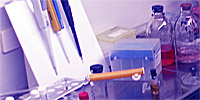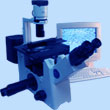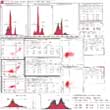
Methods of Investigation
for FP7 partners
and coordinators
|
|||
| Home | |||
| Cytotechnology Group | |||
| Staff | |||
| Methods | |||
| Projects | |||
| Research Results | |||
| Patents | |||
| Image Gallery | |||
| Cooperation | |||
| Contact Us | |||
Cooperation |
|
Laboratory is certified to use autologous, allogeneic and xenogeneic cells for experimental and clinical purposes (including tissue engineering, progenitor cell based therapy, xenogeneic cell transplantation) according National Standard of Quality (Instructions No. 50-0303 and No. 55-0504, approved by Ministry of Health Care). Our laboratory renders assistance in research concerned with receiving a degree in medicine. We also have possibility to transfer R&D results into clinical practice by conducting preclinical and clinical trials in the field of cell and tissue transplantation. Current elaborations:
Challenging elaborations:
|
| COOPERATION NEWS | ||
FP7 Programme involves subjects
|
||
| CURRENT RESEARCH | ||
|
||
| 2005-2007 © LBMI |


